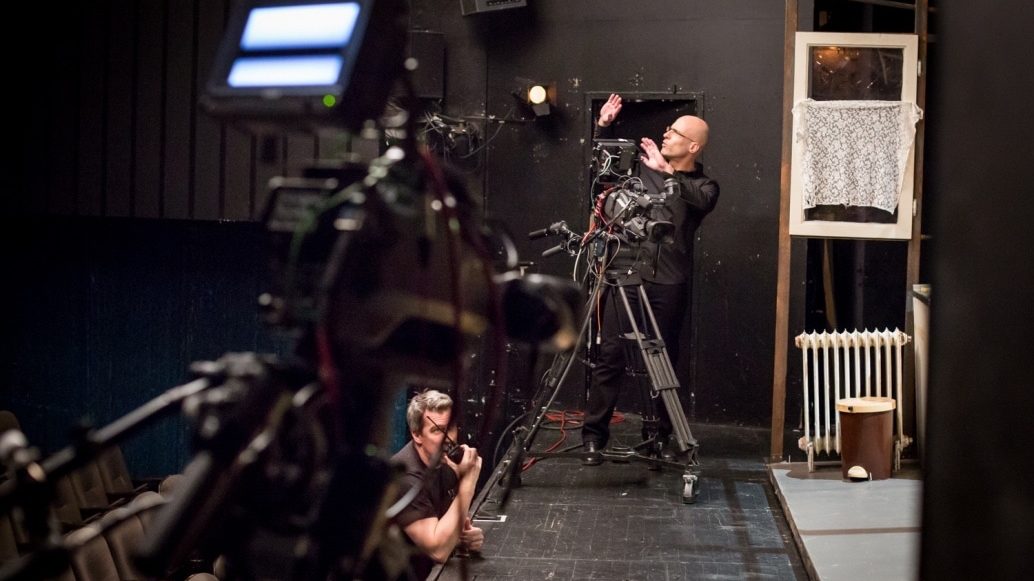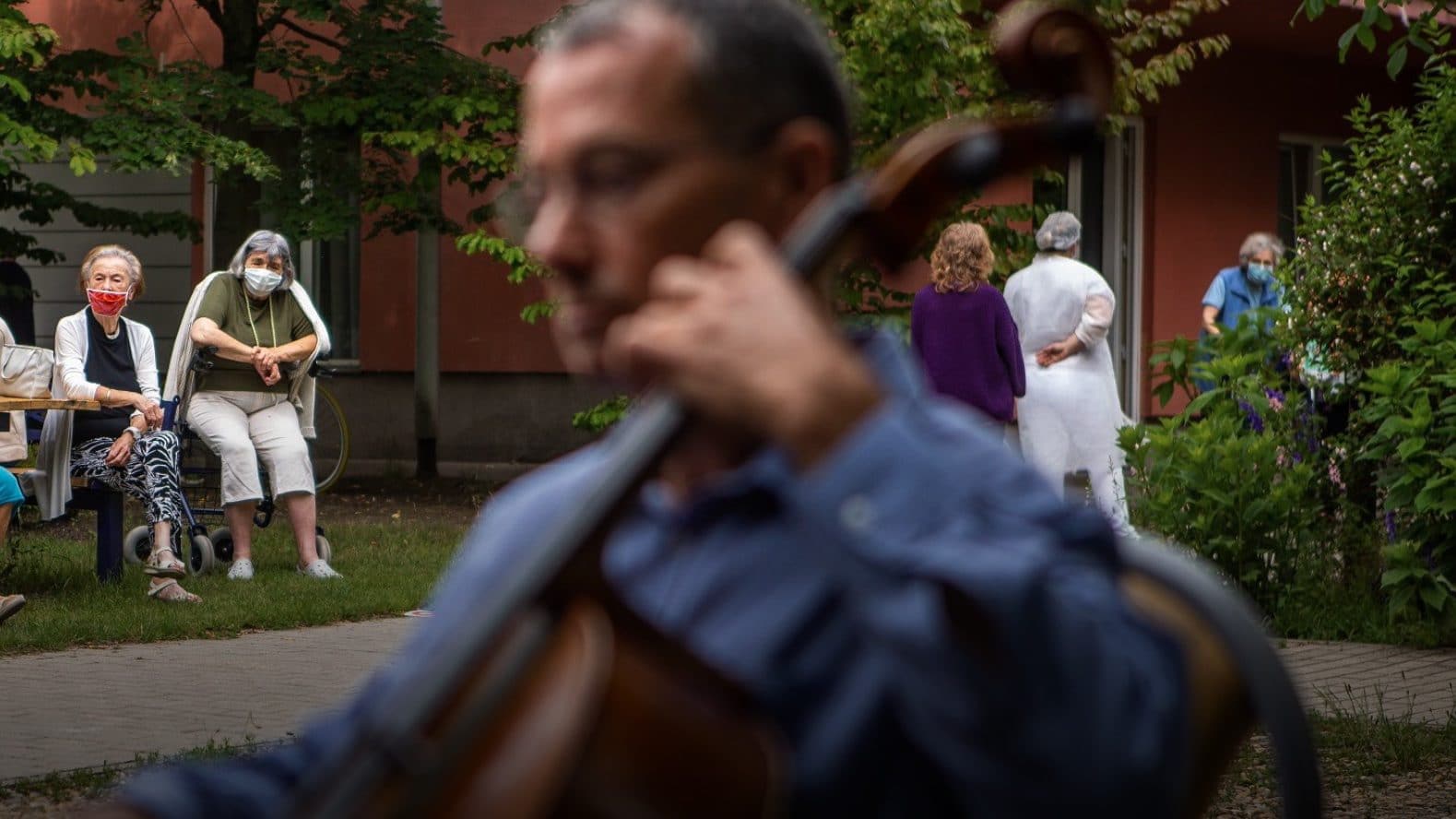The COVID-19 lockdowns are testing the creativity (and resilience) of Hungary’s theatres, musicians and artists.
Maria Takacs dressed up for the evening. She put on a glamorous silk blouse with a smart knee-length skirt, a pearl necklace and high heels. She spent extra time fixing her makeup, adding some blusher and bright red lipstick. She was ready for her usual evening in the theatre. Except there are no theatres open in Hungary due to the COVID-19 pandemic.
Instead, the 70-something Budapest-based intellectual, whose weekly visits to the theatre or a concert have been an integral part of her life for the last 30 years, has made the digital jump and was preparing to watch a streamed version of Ibsen’s “The Enemy of the People”, recorded at the Jozsef Katona Theatre in Budapest. She even had a glass of champagne in the interval, as usual. She later told BIRN that she missed the real theatre atmosphere, but it was altogether very cosy to watch the play “from her comfortable armchair, but still being in the first row”. Not even masks were required, she laughed.
Few Budapest citizens have any living memories of life without the theatres; the last time stages were empty was during the Siege of Budapest in 1944. More than 70 years later, the closure of the theatres and concert halls has shaken the whole cultural sector and tested the creativity of actors, theatre directors and musicians. Some have started reciting poems over the phone, while others chose to experiment with live streaming or offering already recorded theatre pieces at a fraction of the usual cost or even free of charge. To some extent, the experiment has paid off.
Today, eSzínház (eTheatre), the main streaming platform, is offering dozens of plays either live or on-demand, keeping theatres active and serving up good, old-fashioned culture to audiences – many of whom have grown tired of Netflix or commercial television during the lockdown. The founders of eSzínház firmly believe this is not a one-time opportunity to save theatres, but rather a long-term chance to democratise high culture and make it more accessible to a larger number of people, even beyond geographical borders.
The independent Foundation for Hungarian Theatres, which owns eSzínház, was established in 2016 with the main goal of preserving the country’s ‘cultural memory’. “We offered theatre directors the opportunity to record plays at no cost and save them for the future,” Gergely Legradi, the head of eSzínház, told BIRN. “This should have been the task of Hungarian public television, but they have rarely done it since the mid-2000s.”
“We offered theatre directors the opportunity to record plays at no cost and save them for the future.”
However, when the COVID-19 pandemic hit Hungary in March 2020, Legradi went a step further and set up eSzínház, which was the first platform to offer live streaming of stage plays. eSzinhaz has since become a lifeline for the theatre in two respects: under Hungarian law, theatres have to prove that they are actively working, conducting rehearsals and putting on new plays to receive public financing. For actors, directors, writers and stage hands, it answered the existential need for the show to go on while maintaining at least some ticket revenues to provide salaries.
“We are a non-profit foundation with some operational and technical costs, but we transfer 70-90 per cent of the ticket revenues directly back to the theatres. It may sound surprising, but our experience shows that there is a real demand for live streams; actually, more people watch a play online than in the theatre, even compared with a full house,” Legradi said. “I am convinced that there is a future for eSzínház after the pandemic.”

Cameramen setting up a scene in a Budapest theatre. Photo: eSzínház
Even when life eventually gets back to normal, audiences, both inside and outside Hungary, can continue watching highly acclaimed performances, which are sometimes sold out months in advance, he says. The system even allows for traditional language barriers to be broken down, with some theatres providing English subtitles for an international audience. Yet all this requires massive investment, Legradi admits. A high-quality recording of a theatre play needs a crew of around 20 people and eight cameras, putting this option out of reach for smaller theatres and experimental productions.
Fidesz no friend of independent theatre
The pandemic hit the independent, unconventional theatre companies – which traditonally relied on live performance ticket revenues, special funds or sponsorship – particularly hard. Many are now on the verge of financial collapse, with some actors confessing that instead of reciting Hamlet, they are delivering pizzas. Others had to reduce living costs to a bare minimum. “State help for theatres was very limited and even that was unfairly distributed,” Judit Csaki, a well-known theatre critic and former head of department at the Kaposvar theatre, told BIRN.
Last May, the government announced a 1-billion-forint (2.8 million euros) program to help independent theatre companies, but applications were assessed by the two cultural apostles of the nationalist-populist Fidesz government: Attila Vidnyanszky, director of the National Theatre, and Szilard Demeter, director of the Petofi Literary Museum – both of whom are notorious nationalists.
“The problem is that this government is not really interested in culture, they just want to plunder the money.”
Vidnyanszky is also chairman of the government-allied foundation that has taken over the University of Theatre and Film Arts (SzFE) in Budapest, triggering a two-month standoff and a wave of protests last autumn. Szilard Demeter, meanwhile, made it into the international headlines last November when he wrote a screed claiming that “Europe is George Soros’s gas chamber” and attacked multicultural society as being poisonous for Europe’s way of life.
“The problem is that this government is not really interested in culture, they just want to plunder the money,” Csaki claims, adding that even before the pandemic, political loyalty or following a national-conservative line played a role in supporting some theatres at the expense of others.

The Budapest Festival Orchestra performs a free chamber concert, one of its Serenades, in a Budapest private garden. Photo: BFZ – Budapest Festival Orchestra
The National Theatre, for example, gets three times as much money as during the reign of the previous liberal director, Robert Alfoldi, despite fewer performances with much lower attendances. Theatres in some cities outside of Budapest that are run by opposition mayors are pressured to appoint government-friendly directors in exchange for funding. The pandemic has exacerbated this situation, making theatres more vulnerable and empowering ruling party politicians to force a pro-government narrative on them.
Nevertheless, Csaki remains optimistic. Independent theatre won’t disappear, she says, because at the end of the day people can distinguish between a good performance and propaganda. In that sense, eSzinház is a very positive development and could actually aid the survival chances of the country’s theatres, she adds.
Quarantine concerts keep the music alive
Thankfully, the Budapest Festival Orchestra (BFZ), ranked among the top 10 orchestras in the world, is not struggling for financial survival. But even it has had to show creativity and imagination to keep its community together. “It came as a shock. We were playing live concerts abroad at the beginning of March and then, all of a sudden, life came to a complete halt,” Orsolya Erdody, managing director of BFZ, told BIRN.
BFZ’s musical director, Ivan Fischer, also believes that, especially during times of crisis, music remains vital for society. To survive, BFZ first began organising small chamber concerts with four or five musicians who had been tested and streaming the performances on the website. They called these “Quarantine Concerts”. Rather unexpectedly, they also managed to reach people who had never before attended a classical concert. “We have created a quarantine community on Facebook. People were exchanging thoughts and impressions; some confessed they were waiting for the concerts all day, because they were stuck at home with no company at all,” Erdody recalls.
During the summer months [2020, ed.], when the lockdown measures were eased, BFZ began organising free chamber concerts, which they called Serenades, in the gardens of residential buildings in Budapest. Households could apply to host the concerts, which were free of charge, and neighbours enjoy the music from their terraces and balconies. They were an instant hit, with 224 concerts a month being held.
Now live concerts – even small ones – are no longer possible under the new lockdown measures [February 2021, ed.], BFZ is experimenting with streaming, but Erdody says the revenue from that doesn’t come close to a concert in a full house. BFZ used to get half of its funding from the state – from the central government and the municipality of Budapest – with the rest coming from ticket sales and sponsorship, but the balance has flipped towards to state money lately.
“We can’t complain, we have strong financial backing from the Culture Ministry and the Hungarian state. The only condition is that we have to keep on working.”
“We can’t complain, we have strong financial backing from the Culture Ministry and the Hungarian state. The only condition is that we have to keep on working. I tend to agree with this – if you are serious about upholding your high standards, you cannot simply sit back and relax for weeks or months on end,” Erdody argues. She and her fellow musicians in Hungary find it unbelievable that in New York musical life has come to a standstill and musicians laid off.
Yet this remains a very hard time for everybody involved in the country’s cultural sector, Emese Mali, a concert pianist from Budapest, stresses. Though she has tried to regard this year as an opportunity to improve and familiarise herself with new technologies, this mother of two gets by through her teaching job at the Liszt Ferenc Academy of Music. She confesses that without that regular income, it would be very difficult to survive.
While orchestras can receive public funding, individual artists get next to nothing. Tours abroad or special performances are out, so there are few if any opportunities for extra earnings. “Live streaming is fine as a temporary solution, but playing for an empty room with a bunch of musicians wearing masks gives you a very weird feeling,” she sighs.
First published on 1 February 2021 on Reportingdemocracy.org, a journalistic platform run by the Balkan Investigative Reporting Network.
This text is protected by copyright: © Edit Inotai / Reporting Democracy. If you are interested in republication, please contact the editorial team. Copyright information on pictures and graphics are noted directly at the illustrations. Cover picture: Music and digital devices go hand in hand in today’s COVID-struck cultural world. Photo: BFZ – Budapest Festival Orchestra